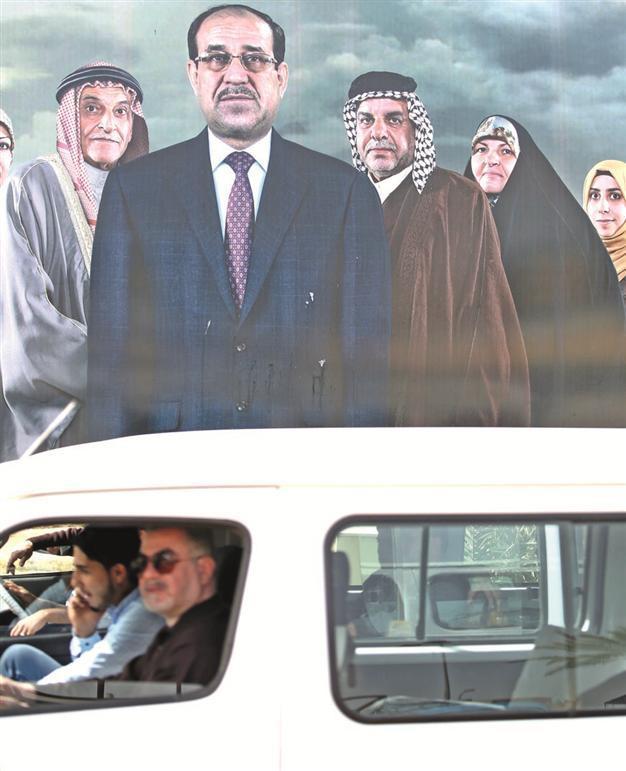Iraqi PM warns of poll delay after resignations
BAGHDAD

A vehicle drives past a huge election poster fronted by Iraqi Prime Minister Nouri al-Maliki (C) in Baghdad. AFP photo
Iraq’s prime minister yesterday warned that April legislative polls may be delayed as he pushed for a controversial election law to be amended after electoral chiefs suddenly quit complaining of political interference.
The electoral officials are pressing for the same reform to the law ahead of the April 30 vote, amid doubts the polls can in any case be held countrywide as anti-government fighters still control a city on Baghdad’s doorstep.
Much is at stake as Prime Minister Nouri al-Maliki bids for a third term with his security credentials dented by a surge in violence to levels not seen since 2008, and as the country battles to rebuild its conflict-battered economy and boost oil production.
Diplomats have said that even though the Independent High Electoral Commission’s (IHEC) nine-member board resigned en masse on March 25, the vote was unlikely to be delayed as all major political parties had agreed it had to take place on time.
‘Endless’ tunnelBut the mere prospect of a postponement has sparked concern, with al-Maliki warning that “if IHEC stays this way, that means ... the election will be delayed.”
“We will enter a tunnel we might not be able to get out of,” the prime minister said in his weekly televised address. “Troubles will come, one after another, against the state.”
The international community also voiced support for the election commission, with the U.S. embassy insisting that timely polls were “of the utmost importance” while U.N. special envoy Nickolay Mladenov warned that any delay would “set a dangerous precedent.”
The IHEC’s board has been frustrated with what they say is a vague provision in Iraq’s electoral law that requires parliamentary hopefuls to be “of good reputation.”
Based on that article, a judicial panel has barred several prospective lawmakers, including al-Maliki opponents such as former Finance Minister Rafa al-Essawi, with no obvious avenue of appeal.
Parliament has meanwhile reportedly ruled that the IHEC must not bar any candidates unless they have criminal convictions, a decision an electoral official said was at odds with that of the judicial panel.
Al-Maliki called for IHEC board members to withdraw their resignations while urging Parliament to pass an amendment to the law “as fast as possible.” The looming vote has been a factor in the rising bloodshed in recent months, analysts and diplomats say.
Despite widely trumpeted operations against insurgents, bloodletting has continued, with more than 450 people killed so far this month and upwards of 2,100 already this year.
The April election is the first national vote since March 2010, when parliamentary polls resulted in a months-long government formation process that ultimately resulted in a national unity cabinet with al-Maliki retaining the premiership.
